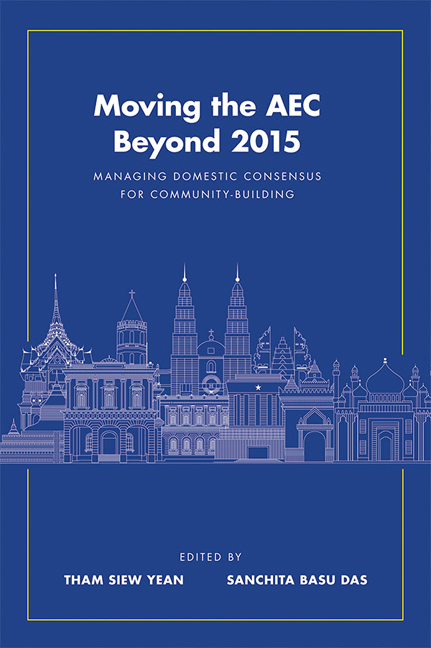Book contents
- Frontmatter
- Contents
- Foreword
- Preface
- Acknowledgements
- Abbreviations
- About the Contributors
- 1 Introduction: Economic Interests and the ASEAN Economic Community
- 2 ASEAN Economic Cooperation and Its Political Realities
- 3 Indonesia's Implementation of Facilitation and Harmonization Measures under the AEC
- 4 The AEC and Domestic Challenges in Malaysia: Examining the Liberalization of Services in AFAS
- 5 The Philippines and the AEC Beyond 2015: Managing Domestic Challenges
- 6 The AEC Beyond 2015: Implementation and Challenges for Singapore
- 7 Moving the AEC Beyond 2015: Managing Domestic Economic Interests in Thailand
- 8 Managing Domestic Consensus for ASEAN Community Building in Vietnam
- Index
4 - The AEC and Domestic Challenges in Malaysia: Examining the Liberalization of Services in AFAS
Published online by Cambridge University Press: 06 January 2018
- Frontmatter
- Contents
- Foreword
- Preface
- Acknowledgements
- Abbreviations
- About the Contributors
- 1 Introduction: Economic Interests and the ASEAN Economic Community
- 2 ASEAN Economic Cooperation and Its Political Realities
- 3 Indonesia's Implementation of Facilitation and Harmonization Measures under the AEC
- 4 The AEC and Domestic Challenges in Malaysia: Examining the Liberalization of Services in AFAS
- 5 The Philippines and the AEC Beyond 2015: Managing Domestic Challenges
- 6 The AEC Beyond 2015: Implementation and Challenges for Singapore
- 7 Moving the AEC Beyond 2015: Managing Domestic Economic Interests in Thailand
- 8 Managing Domestic Consensus for ASEAN Community Building in Vietnam
- Index
Summary
INTRODUCTION
Services currently account for more than two-thirds of the world's GDP (63 per cent in 2013) although its share in total trade remains below 20 per cent (WTO 2014a). It should, however, be noted that traditional trade statistics, which measure gross trade flows rather than value-added at various stages of production, may strongly underestimate the contribution of services to international trade as shown by recent research on production through global value chains (GVCs). These GVCs make extensive use of services such as information and communication technology (ICT), logistics, transport, distribution and business services (United Nations 2014). Almost half (46 per cent) of value-added in exports is contributed by service-sector activities. This share is higher in developed countries (50 per cent) than in developing countries (38 per cent). This fact confirms that greater value-added tends to be captured by developed countries, in which many transnational corporations are headquartered, largely through services activities. More importantly, two-thirds of global foreign direct investment (FDI) stock concentrates on services, underscoring the importance of openness to FDI in services, especially for developing countries where the services sector tends to be more protected than manufacturing.
In Malaysia, the service sector has also grown considerably over time. In 1990, it contributed towards 44.5 per cent of the country's GDP and 53.5 per cent of its total employment. By 2014, its contribution to GDP was 55.3 per cent while the share to employment was 59.4 per cent (Ministry of Finance, Malaysia 2014). Its importance for the country in terms of complementing growth in manufacturing was first recognized in the Second Industrial Master Plan (IMP2: 1996–2005) that introduced the idea of developing supporting services under its “Manufacturing ++” strategy, or the cluster-based development strategy. Nevertheless, no specific service sectors were targeted for development. In contrast, the Third Industrial Master Plan (IMP3: 2006–20) not only reiterates the importance of the service sector as an important intermediary for supporting the development of businesses and trade in all sectors, but it further targets eight service sub-sectors for development. These are business and professional services, distributive trade, construction, education and training, healthcare services, tourism services, ICT services and logistics. The contribution of these sub-sectors as new sources of growth for the country includes their potential to provide linkages and spill-overs between sectors.
- Type
- Chapter
- Information
- Moving the AEC Beyond 2015Managing Domestic Consensus for Community-Building, pp. 68 - 93Publisher: ISEAS–Yusof Ishak InstitutePrint publication year: 2016

